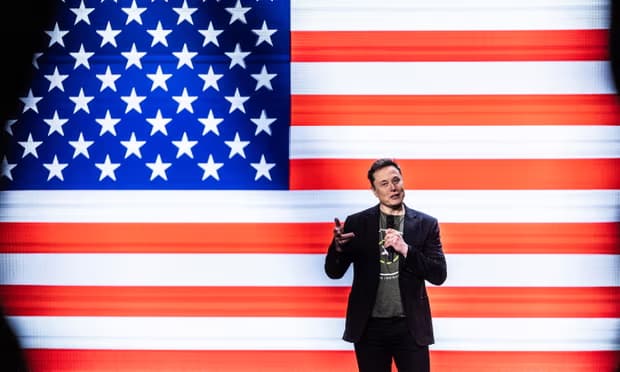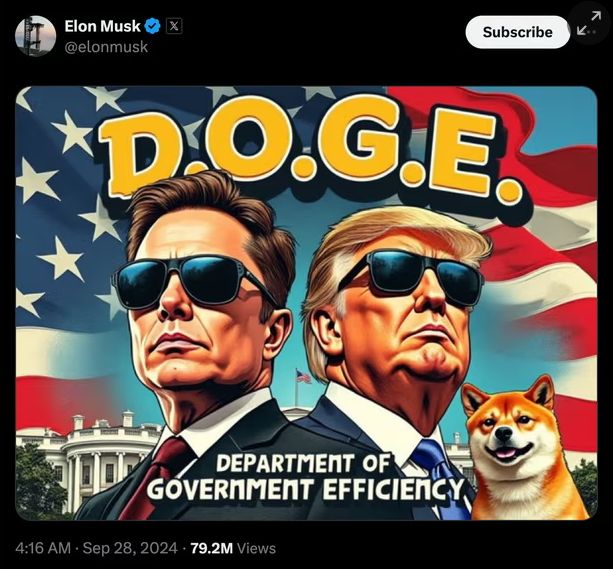Washington Post Says It Will Not Endorse Candidate for First Time in 30 Years

For the first time in over 30 years, the Washington Post announced on Friday its editorial board would not be making an endorsement of a candidate in a presidential election.
“We are returning to our roots of not endorsing presidential candidates,” Will Lewis, the newspaper’s publisher and chief executive officer said in a statement on Friday, less than two weeks before the 2024 presidential election.
The Washington Post editorial board has endorsed a candidate for almost every presidential election since it endorsed Jimmy Carter in 1976. Jeff Bezos, the billionaire owner of Amazon, bought the Post in 2013.
The decision by the Post’s leaders not to endorse any candidate in an election widely seen as the most consequential in recent US history triggered outrage among some prominent current and ex-staffers, and other notable figures.
Marty Baron, the former executive editor of the Washington Post, criticized the newspaper’s decision, calling it “cowardice, with democracy as its casualty”.
Donald Trump, Baron said, will “see this as an invitation to further intimidate the owner” of the Washington Post, the billionaire Jeff Bezos. “Disturbing spinelessness at an institution famed for courage,” he added.
Susan Rice, the former US ambassador to the United Nations and former domestic policy adviser for the Biden administration, called the decision “hypocritical”.
“So much for ‘Democracy Dies in Darkness’,” she said, referring to the newspaper’s official slogan, adopted in 2017 under Bezos’s ownership. “This is the most hypocritical, chicken-shit move from a publication that is supposed to hold people in power to account.”
David Maraniss, a Pulitzer-winning reporter and editor at the Post, added: “The paper I’ve loved working at for 47 years is dying in darkness.” Multiple outlets have also reported that Robert Kagan, the newspaper’s editor at large, has decided to resign from the editorial board following the announcement of the paper not to endorse in the presidential race.
A senior Post staffer, speaking to the Guardian on condition of anonymity, pointed out: “The Post’s editorial board just won a Pulitzer Prize for calling out authoritarianism and defending democracy around the world”, adding: “How sad is it that we can’t do that at home?”
“There’s a lot of sadness and frustration among staff,” they added. “Most of all, it feels like a blow to WaPo’s long tradition of courageous coverage.”
The Washington Post’s decision comes after widespread shock over a similar decision from the billionaire owner of the Los Angeles Times, Patrick Soon-Shiong, earlier this week, to block a planned presidential endorsement of Kamala Harris. That move triggered high-profile resignations at the publication amid staff anger.
In his statement on the Post’s decision, Lewis cited times in the past when the newspaper’s editorial board chose not to endorse presidential candidates, citing independent journalism, which Lewis described as “right” and something the paper was now “going back to”.
“We recognize that this will be read in a range of ways, including as a tacit endorsement of one candidate, or as a condemnation of another, or as an abdication of responsibility,” Lewis said.
“That is inevitable,” he said, adding: “We don’t see it that way.”
Rather, Lewis said it was “consistent with the values” the newspaper has stood for, and what the newspaper hoped for in a leader: “character and courage in service to the American ethic, veneration for the rule of law, and respect for human freedom in all its aspects”.Lewis added that not endorsing was, in his view, also a statement in support of readers’ ability to make up their own minds on the most consequential of American decisions – “whom to vote for as the next president”.
“Our job at the Washington Post is to provide through the newsroom non-partisan news for all Americans, and thought-provoking, reported views from our opinion team to help our readers make up their own minds,” he said, adding: “Most of all, our job as the newspaper of the capital city of the most important country in the world is to be independent.”
“And that is what we are and will be,” he concluded.
NPR reported that many Washington Post staffers were said to be “shocked” and their reaction “uniformly negative”.
The Washington Post Guild, the union that represents many of the paper’s staffers, said in a statement on Friday that it was “deeply concerned” by the newspaper’s decision, “especially a mere 11 days ahead of an immensely consequential election.
“The role of an editorial board is to do just this: to share opinions on the news impacting our society and culture and endorse candidates to help guide readers,” it added.
The Guild also said that according to the paper’s reporters and Guild members, the endorsement for Harris was already drafted and the decision not to publish was made by Bezos himself. The Guild said that they were already seeing cancellations from once loyal readers.
The Columbia Journalism Review also reported on Friday that the Washington Post’s editorial board had already drafted an endorsement of Harris, and said that even as of a week ago, the editorial page editor David Shipley told the editorial board that the endorsement was on track, leaving the board and staffers “stunned” when the announcement was made on Friday.
At the Los Angeles Times, the decision not to endorse resulted in the head of the editorial board there, Mariel Garza, and several other members of the board resigning in protest.
“In dangerous times, honest people need to stand up. This is how I’m standing up,” Garza told the Columbia Journalism Review, regarding her decision to resign.
A journalist at the Los Angeles Times called their newspaper’s decision “unreal” and “cowardly”.
The Los Angeles Times publisher’s daughter weighed in on her father’s decision not to have the newspaper endorse a candidate, and posted a series of statements on social media implying that the decision to not endorse a candidate was also connected to Harris’s position on the war in Gaza.
“This not a vote for Donald Trump,” she said, but rather a refusal to endorse Harris, who, she said “is overseeing a war on children”.
Unlike the Los Angeles Times and the Washington Post, in September the editorial board at the New York Times endorsed Kamala Harris, calling her “the only choice” for president.
The Guardian has also endorsed Harris.
This article was amended on 26 October 2024 to correct a misspelling of David Maraniss’s surname.
Also from The Guardian -- Related
What Does Elon Musk Want from All this Politicking?
The Billionaire Is Pledging to Give Away $1m a Day and Campaigning Hard – Is Deregulation the Driving Motivation?
by Blake Montgomerry
October 23, 2024

Elon Musk speaks at Life Center church in Harrisburg, Pennsylvania, on Saturday. Photograph: Sean Simmers/AP
Over the weekend, Elon Musk pledged to give away $1m a day to registered voters in battleground states in the US who sign a petition by his America Pac in support of the first and second amendments. He awarded the first prize, a novelty check the size of a kitchen island, at a Pennsylvania rally on Saturday and the second on Sunday in Pittsburgh. He says he’ll keep doing it until the election on 5 November. The stunt is potentially illegal, experts say.
After endorsing Donald Trump in July, Musk quickly founded America Pac and funded it with $75m. For the past several weeks, he’s been making multiple in-person campaign appearances per day, focusing especially on Pennsylvania, a swing state.
What is Musk campaigning for?
My colleagues Nick Robins-Early and Rachel Leingang published a piece last week looking at Musk’s inescapable influence on the US presidential election. The article dives into the past several months of Musk’s political activities, but I was particularly fascinated by one question it posed: is deregulation the driving motivation behind Musk’s political endeavors across the globe? Is all this spending and campaigning about cutting government departments?
Rachel and Nick write:
These constant fights with the full alphabet of regulatory agencies has coincided with Musk making numerous public statements in favor of deregulation, as well as calling for a full-scale audit of the federal government. That idea has found purchase with Trump, who announced in September that he would launch a Musk-led government efficiency commission that would audit federal agencies for places to cut. Musk wants to call it the Department of Government Efficiency, or Doge, invoking one of his favorite memes, an expressive shiba inu.

A tweet by Elon Musk about his proposed Department of Government Efficiency, or Doge. Photograph: X/The Guardian
Although the plan is vague on details and fails to address the obvious conflict of interest in Musk auditing the regulators that oversee his companies, both Trump and Musk have repeatedly brought up the idea of Musk holding some role in a potential Trump administration. During an appearance on Fox News earlier this week, Trump said that he would create a new position called ‘secretary of cost-cutting’ and appoint Musk.
‘He’s dying to do this,’ Trump said.
What does Musk want around the world?
Musk’s fight for fewer government agencies is not limited to the US, though. Sometimes, his fights with “the regulators” set him against other billionaires. In India, Musk is fighting with the government over the distribution of satellite broadband and emerging victorious over Mukesh Ambani. Asia’s richest man had sought terms more favorable to his own telecommunications empire.
He has proclaimed himself a “free-speech absolutist” and complained about the regulators of speech. When the UK was in the throes of violent race riots a month after its general election, Musk tweeted, “Civil war is inevitable,” and posted a cartoon showing a character in an electric chair, claiming that this would be the government’s punishment for free speech in the UK by 2030. He has made similar critiques of the California government and Joe Biden’s administration.
His fight for deregulation regularly pits him against the judiciary in whichever country where he’s operating. Last month, Brazil blocked access to X over its failure to comply with a judge’s orders and then fined Starlink, a subsidiary of SpaceX, for its sister company’s transgressions. Musk and X eventually acquiesced.
Are the regulators fighting back against Musk?
Recently, some of the regulators have taken a new tack: they’re starting to penalize one Musk company for what another Musk company (or Musk himself) does.
Last week, Europe’s regulators took a page out of Brazil’s book, communicating to lawyers at X that the EU could levy fines against the social media company for failing to comply with the Digital Services Act. Crucially, the regulators suggest calculating that tax not just based on X’s revenues, but the total revenue of Musk’s businesses. The penalty, presumably much higher, could financially hobble the social media platform.
In California, a coastal commission cited Musk’s propensity to tweet misinformation during a vote to reject a petition by SpaceX and the US air force to launch more rockets from a base on a Santa Barbara beach. Musk sued in response, alleging political bias and first amendment violations. He just wants to be left alone to launch rockets and tweet and spend tens of millions on the presidential election in peace.
Anna Betts is a breaking news reporter for Guardian US
Blake Montgomery is tech editor for Guardian US in New York City.
Guardian US: Covering American and international news for an online, global audience.
Guardian US is renowned for the Paradise Papers investigation and other award-winning work including, the NSA revelations, Panama Papers and The Counted investigations.
